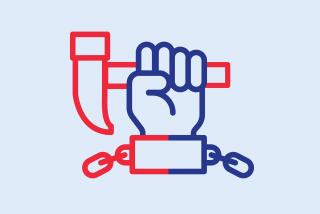Jerry Brown has plan to ease prison crowding without early releases
SACRAMENTO — Gov. Jerry Brown and top lawmakers pledged Tuesday to ease prison crowding without releasing inmates early, laying out a plan to spend hundreds of millions of dollars for alternate housing.
The proposal, which has divided Democratic leaders, would pay for enough beds in privately owned prisons and other facilities to shed more than 9,600 inmates from state lockups by the end of the year, as federal judges have ordered.
“This is the sensible, prudent way to proceed,” Brown said at a Capitol news conference. “The plan is to find as many cells as needed.”
Paying for the extra housing would drain $315 million from the state’s $1.1-billion reserve over the next year. The price tag is expected to increase to $415 million for each of the following two years.
The proposal would avoid inmate releases while Brown continues fighting the order to reduce the population in state prisons, which the judges say are unconstitutionally crowded. Plans his administration previously considered could have forced the state to free about 1,000 inmates before their sentences were finished.
The governor is appealing the judges’ order to the U.S. Supreme Court but in the meantime is taking steps to comply.
Brown faces an array of political challenges in pushing his plan through the Legislature, notably opposition from Senate leader Darrell Steinberg (D-Sacramento). Assembly Speaker John A. Pérez (D-Los Angeles) and Republican leaders in both houses flanked Brown for his announcement, but Steinberg was absent, saying later that he would issue his own prison plan Wednesday.
“The governor’s proposal is a plan with no promise and no hope,” Steinberg said in a statement. “As the population of California grows, it’s only a short matter of time until new prison cells overflow.”
The Senate leader has called for more spending on mental health and drug treatment programs that can reduce the number of ex-offenders who return to prison, helping to lower the inmate population in the long run.
Brown and Pérez said they also would consider more long-term solutions to prison crowding, such as changes in sentencing laws. Meanwhile, the funding for alternative cells is needed, they said.
“We are not going to release a single additional prisoner,” Pérez said.
The proposal announced Tuesday would move thousands of offenders from state facilities to privately owned prisons in and outside of California and reopen city-owned detention facilities in Shafter and Taft, in the Central Valley. More inmates could be placed in county jails.
Law enforcement groups representing district attorneys, police chiefs, county sheriffs and others are backing the plan.
“The efforts by the governor will help protect our communities,” said Nevada County Sheriff Keith Royal.
More key support comes from the politically powerful prison guard union, which has strongly opposed outsourcing of inmate housing. But Brown’s plan would use state guards in a privately owned prison in Kern County.
Brown’s political risks extend into next year, when he may run for reelection and face off with critics of his prison policies. One possible challenger, Republican former Lt. Gov. Abel Maldonado, is pushing a ballot measure to undo some of Brown’s policies.
But on Tuesday, top Republican lawmakers said the governor was taking the right steps.
“Our No. 1 responsibility is public safety,” said Senate Republican leader Bob Huff (R-Diamond Bar). “We can’t allow dangerous inmates on our streets.”
Lawmakers have less than three weeks to consider Brown’s proposal before they adjourn. The Assembly budget committee is scheduled to convene Thursday to begin discussions.
Brown’s effort to comply with the court order has short-circuited some of his previous plans to lower prison spending and end contracts to house inmates out of state. If the Legislature approves his proposal, prison spending will outpace state funding for higher education in the current fiscal year.
Don Specter, a lawyer for inmates who have sued the state over prison conditions, said leasing more prison space would be “an incredible waste of hundreds of millions of dollars for no benefit to public safety.”
He said the state should consider some early releases, by expanding the credit prisoners can earn for good behavior or freeing inmates who are elderly and sick.
Times staff writers Patrick McGreevy and Paige St. John contributed to this report.
More to Read
Sign up for Essential California
The most important California stories and recommendations in your inbox every morning.
You may occasionally receive promotional content from the Los Angeles Times.











